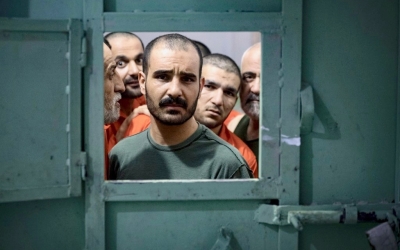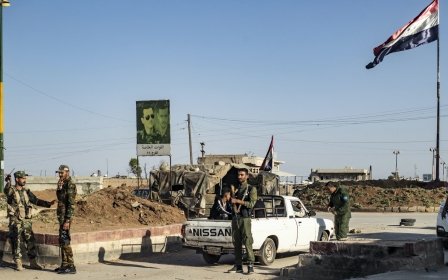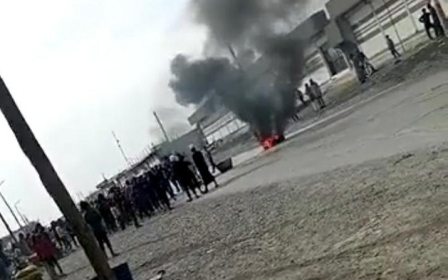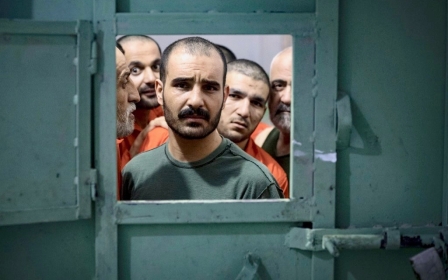Syria: More than 210 reported dead as Islamic State attacks prison in al-Hasakah
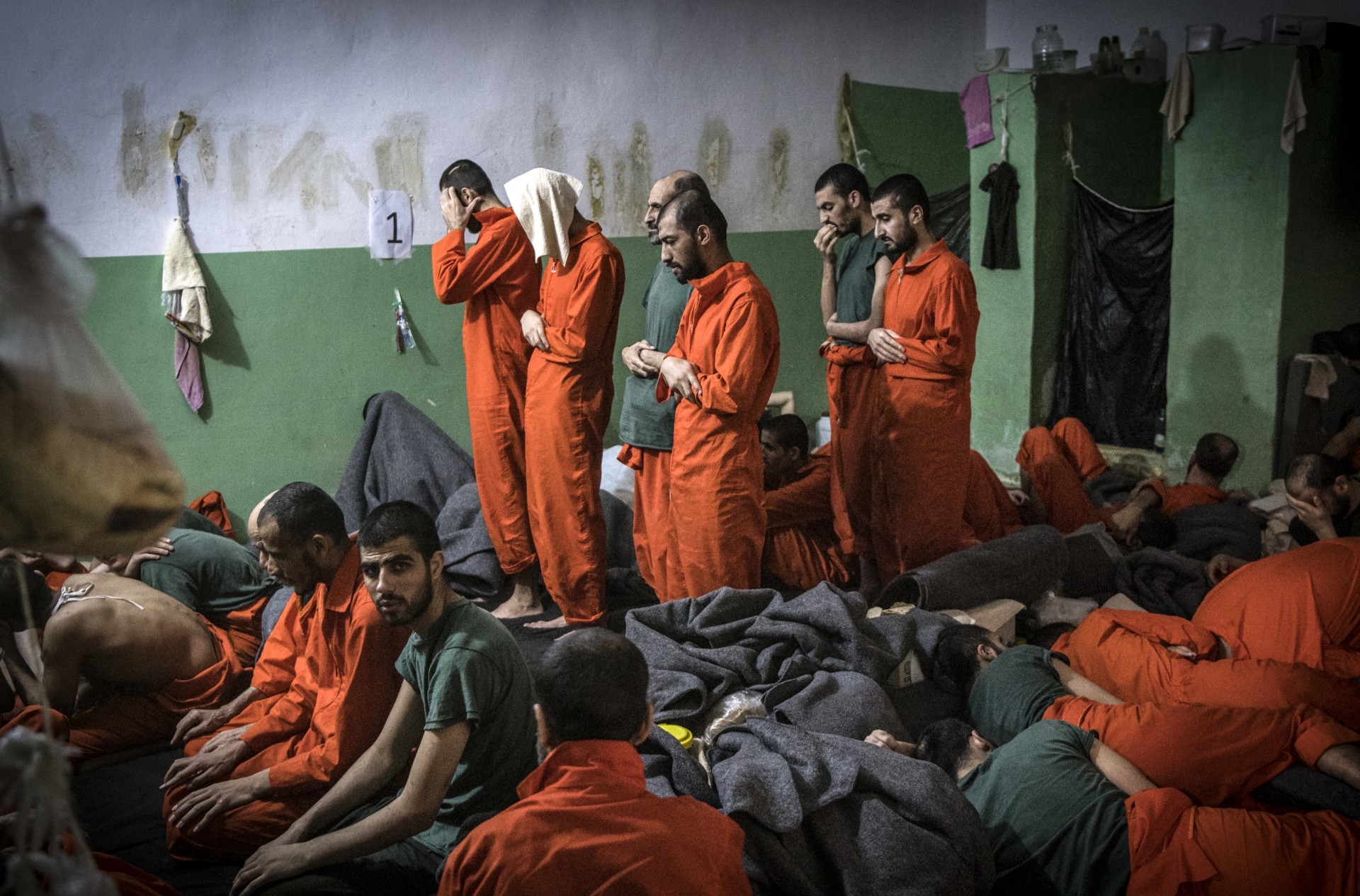
An ongoing attack by Islamic State (IS) fighters on a Syrian prison housing thousands of suspected members of the group is reported to have left more than 210 people dead.
More than 200 IS combatants late on Thursday attacked the Kurdish-run Ghwayran jail in al-Hasakah city to free fellow fighters, in the most significant IS operation since its self-declared caliphate was defeated in Syria nearly three years ago.
IS "sleeper cells... infiltrated from the surrounding neighbourhoods and clashed with the internal security forces," the Kurdish-led Syrian Democratic Forces (SDF) said of the attack.
Intense fighting since then has seen the militants free detainees and seize weapons stored at the jail, according to the UK-based Syrian Observatory for Human Rights (SOHR), which relies on a network of sources inside Syria.
The SDF said on Sunday that it had killed more than 175 IS fighters.
While at least "39 Kurdish fighters, including internal security forces, prison guards and counter-terrorism forces, have been killed" inside and outside the prison, said Rami Abdurrahman, head of SOHR.
At least seven civilians are among those who died in the fighting in the northeastern city, the monitor said.
Kurdish forces, supported by the international coalition, have recaptured more than 100 IS fighters, according to the SOHR. Dozens more are still believed to be on the loose.
The SDF said in a Sunday press release that plans for the Thursday attack began six months ago.
The SDF now has control of the area around the prison, it said, adding that there was still some fighting inside the complex. It has launched a counter-offensive on IS units in the area.
'We don't know where to go'
The chaos of the fighting has forced 4,000 civilians in the area to flee, according to Hasakah governor Ghassan Khalil.
The SDF has carried out combing operations and used loudspeakers to call on civilians to leave, according to an AFP correspondent.
IS fighters "are entering homes and killing people", said a civilian in his thirties fleeing on foot.
"It was a miracle that we made it out," he told AFP, carrying an infant wrapped in a wool blanket.
"The situation is still very bad. After four days, violent clashes are still ongoing."
Hamsha Sweidan, 80, who had been trapped in her neighbourhood near the jail, said civilians were left without bread or water as the battle raged.
"We have been dying of hunger and of thirst," she told AFP as she crossed into SDF-held areas in the city. "Now, we don't know where to go."
Black flag
IS, in a statement released on its Amaq news agency overnight, claimed that it took over a weapons storage room in the prison and had freed hundreds of fellow fighters since the operation began with a double suicide bombing.
A video it released on Amaq purported to show IS fighters carrying the group's black flag as they launched the attack on the facility and surrounded what appears to be a group of prison guards.
'The attack in Hasakah makes plain the continued threat ISIS poses'
- Clara Moore, Syria researcher, Rojava Information Center
A second video released on Saturday showed nearly 25 men who IS said it had abducted as part of the attack, including some dressed in military fatigues.
The authenticity of the footage has not been verified.
Commenting on the video, the SDF said the captives were "kitchen staff" from the jail.
"Our forces lost contact with them during the first attack," it said in a statement, without elaborating.
Warnings
The SOHR said the Kurdish security forces at the prison were not officially affiliated with the SDF, the semi-autonomous Kurdish administration's de facto army.
The SDF is backed by the United States and has fought in support of the US-led coalition against IS.
Arab tribal figures in touch with residents in the area said US coalition planes were seen flying overhead following the incident.
Ghwayran prison, in the northeast of al-Hasakah, holds about 3,500 suspected IS members, including some of the group's senior leadership, according to the SOHR. They come from roughly 30 different countries.
The SDF described Ghwayran jail on Sunday as the "largest... and most dangerous" of those holding suspected IS detainees in the region.
Relatives of those detained say many of the inmates are young children and others arrested on flimsy charges or for disobeying the SDF’s policy of forcible conscription, Reuters reported.
There are reportedly 650 children in the prison.
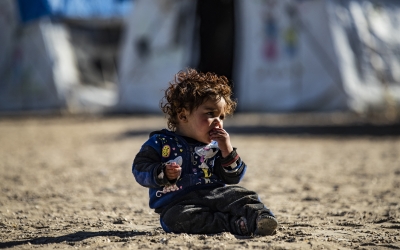
The United States has condemned the attack, praising the SDF's response, and noting that IS fighters have been trying to free prisoners for more than a year.
"It is a credit to the diligent, capable efforts of the SDF and Global Coalition to Defeat ISIS Forces that they were able to thwart numerous attacks during that period and limit the severity of this one," State Department spokesman Ned Price said in a statement, using another acronym for IS.
The Kurdish authorities have long warned they do not have the capacity to hold, let alone put on trial, the thousands of IS fighters captured in years of operations.
"The attack in Hasake makes plain the continued threat ISIS poses," Clara Moore, a Syria-based researcher at the Rojava Information Center (RIC), told MEE, urging the international community to "offer more serious support" to Kurdish allies in the region.
"A good first step would be to turn our attention to the thousands of minors from the region and abroad who are living in the region's refugee camps and detention facilities. For those who are citizens of foreign nations, repatriation must happen as soon as possible. This is especially urgent for the boys held in detention, who are often left in legal purgatory once they turn 18."
Wladimir van Wilgenburg contributed to this report.
Middle East Eye propose une couverture et une analyse indépendantes et incomparables du Moyen-Orient, de l’Afrique du Nord et d’autres régions du monde. Pour en savoir plus sur la reprise de ce contenu et les frais qui s’appliquent, veuillez remplir ce formulaire [en anglais]. Pour en savoir plus sur MEE, cliquez ici [en anglais].


